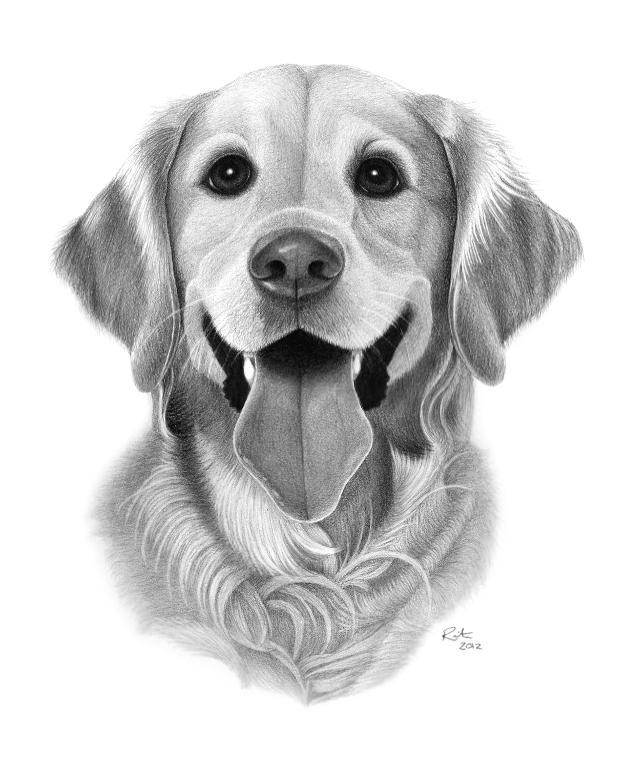Hardest Drawing in the World
Ready to Advance Your Art? Draw These 8 Challenging Subjects
We've already explored easy pictures to draw. But at a certain point, as an advancing artist who wants to continue building drawing skills, you may want to explore the other end of the spectrum: challenging subjects to draw.

In some ways, what is "challenging" can be subjective; a subject that's difficult for one artist may be a breeze for another. However, the subjects featured in this post seem to prove fairly universally challenging to developing artists. Challenging, but not impossible!
Challenge your artistic by trying these hard things to draw!

Pet portrait via Rita Frazee
1. Animal and pet portraits
Drawing animals can provide many challenges for an artist. For one, it can be tough to capture the creatures' anatomy without ending up with a warped or wonky-looking result. Rendering accurate proportions only only becomes more difficult when the subject is straight on, as in the above drawing, or at a 3/4 angle.
Capturing the different textures of the fur, hair and whiskers can be tricky while remaining accurate and intentional. Be sure to start with a good repertoire of reference material before beginning to draw an animal or pet portrait. Working from high-quality photographs, as the artist did to create the portrait above, is a great way to get started with realistic animal portraits.

Glass in colored pencil via rmercado-artist
2. Glass
How can something see-through be so tricky to draw? But tricky it is, indeed. Not only are challenged with the idea of drawing something clear that shows substance, but you also have to contend with unique shadows, highlights and reflections in the glass itself. And don't forget about the background! The above drawing, rendered in colored pencil on board, does a wonderful job of capturing all of the above, showing glass bottles that are substantive yet see-through and light.
Rather than looking at drawing glass as an impossible prospect, begin to break it down into easier steps. First, focus on the shape of the vessel. Then, look for strong highlights and contrasts. Begin to add shadows and color, and you'll see that piece by piece, your drawing will begin to come to life.

Eye study via GemmaFurbank
3. Eyes and facial features
About face! The face is the most important part of any portrait, and it's full of tricky features such as curvy ears and noses, subtly arced cheek bones, rounded lips and of course the pièce de resistance, the eyes. In portraits, the eyes are often the focal point.
Eyes are deceptively tricky to master. Yes, there are plenty of technical challenges, including scale, shapes, detail and reflection. But what is perhaps even more challenging is managing to master the technical details of drawing eyes while retaining a clear expression and personality. It can be easy to end up with precise-looking eyes that appear expressionless, as if the subject in question is engaging in a staring match.

Copy from the masters via Roberto Osti
4. Human figures
There's a reason art schools dedicate a year or more of coursework to drawing the human figure: it's vital to creating figure-based art. Capturing accurate proportions and expressive movement proves to be an ongoing challenge for many. However, there is a simple solution: learn more about anatomy. A lack of knowledge is often an artist's biggest holdup.

Holding Pawpaw's hand via Stacy Powers
5. Hands and feet
Even with a solid basic knowledge of human anatomy, drawing hands (and feet) remains very difficult. Many artists learn to draw fluid and natural figures, but they have block-like, stiff appendages. Often, the impulse is to draw over-realistic hands that become heavy in a piece, making it lose a natural look. However, this doesn't have to be the case; as the above colored pencil piece proves, hands can be realistically rendered yet also retain a softness, with a fluid sense of subtle movement.
By focusing on drawing hands and feet, learning more about the specific anatomy and range of motion of the fingers, toes, wrists, and ankles, an artist can gain confidence in drawing these challenging parts of the body.

Porsche via Michael Vizard
6. Automobiles
Shiny highlights, mechanical precision and plenty of curves and angles — drawing automobiles provides quite a challenge to an artist. Mastering the details while also capturing the unique shape of cards can be daunting, but it's not an impossibility.
First, focus on the basic shape of the automobile; act as if you're capturing its basic anatomy. From there, you can act like a sculptor in your drawing, whittling away at subtleties of the shape and then beginning to work on details.

Mom's rose via Terri Lancaster
7. Flowers
Flowers are a unique, versatile subject matter because they can be as simple or as complex as you'd like. Perhaps when you're first starting out in your drawing, you'll draw simplified petals and leaves. As you advance, so can your floral shapes. The above colored pencil rendering is a breathtaking example of how a flower is anything but ordinary when it is realistically rendered in colored pencil with shadows, color graduations and delicate petals in various stages of unfold.
Blossom as an artist in Vivid Flowers in Colored Pencil, where you'll learn advanced techniques for drawing realistic florals »

Apple and water droplet study via StephenAinsworth
8. Water
Whether it's delicate drew drops or a wide ocean, can prove challenging to master in a drawing. Once again, you have challenges similar to drawing glass: a translucent sheen, bright highlights and reflective qualities. But then you also have the element of movement. The above image, rendered in pencil and white pastel, elegantly captures droplets of water have a sense of movement, as if they may at any moment drip down the fruit. Much of this is thanks to expert shading and application go highlights.
What do you find challenging to draw?
Source: https://www.craftsy.com/post/hard-things-to-draw/
0 Response to "Hardest Drawing in the World"
Post a Comment